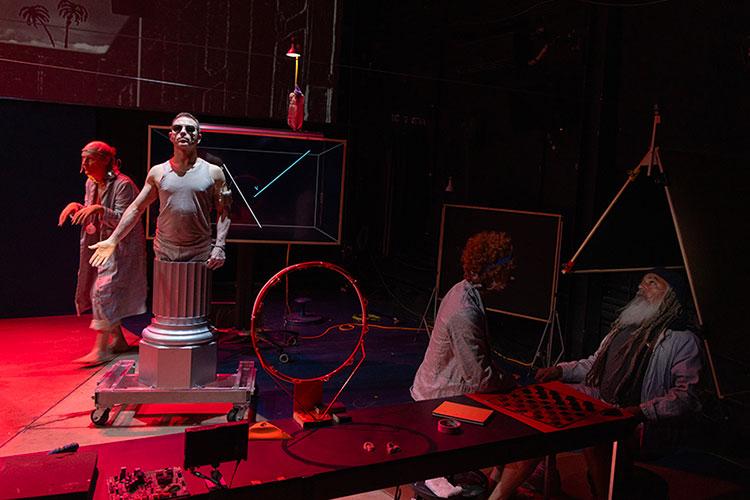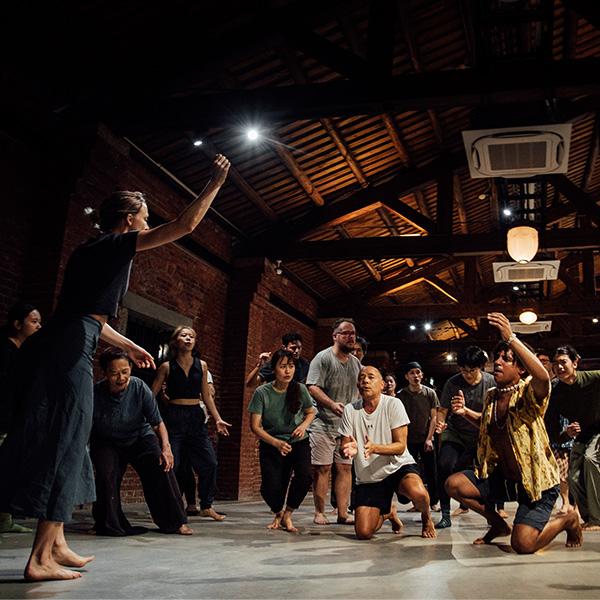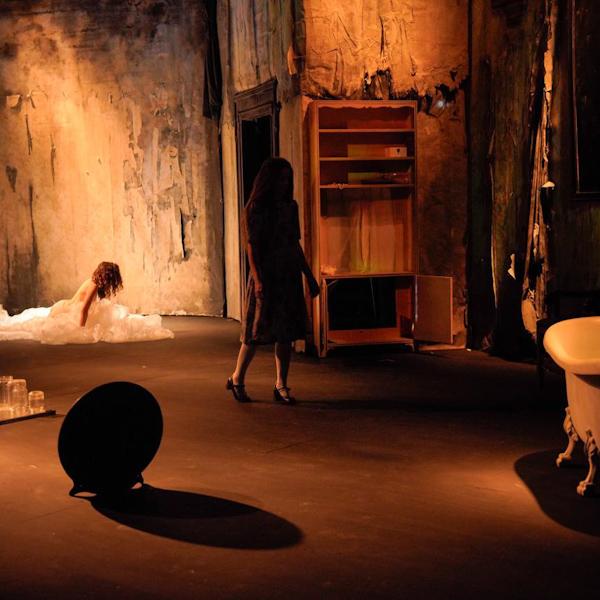
Biennale Teatro 2025: Theatre is Body - Body is Poetry
The physical presence of actors and their centrality to the scenic creation is the leitmotif of the 53rd International Theatre Festival Theatre is Body. Body is Poetry (May 31 - June 15), directed by Willem Dafoe.
Theatre is Body - Body is Poetry
The physical presence of actors, their centrality to the scenic creation, is the leitmotif of the 53rd International Theatre Festival entitled Theatre is Body. Body is Poetry, which will run from May 31 to June 15 in Venice, under the direction of Willem Dafoe. “The body, its presence, its intelligence beyond our control, is the beating heart of the theater. It drives the meeting of the people on stage and the public, to create an instantaneous community with a commitment to attention and a possibility to wonder even in this age of virtual experiences.” A specificity of the body that is at the center of the many revolutions that have changed the language of theatre over the past century, original matrices of a new kind of theatre, still today a harbinger of impulses and possibilities. It is a return to the origin for Dafoe, whose roots are firmly anchored in the Wooster Group’s experimental theatre.
Four major areas of research interweave in the 53rd International Theatre Festival:
1.
Venice 75/25. Fifty years of new theatre
The interface between yesterday and today was the 1975 Biennale Teatro, directed by Luca Ronconi; it was the cornerstone of the experiences of new theatre, involving seminal figures on both sides of the Atlantic. The Festival pays tribute to some of those protagonists: Eugenio Barba and Julia Varley of the legendary Odin Teatret, who will be in Venice with their most recent work, Le nuvole di Amleto; Thomas Richards, who was with the Workcenter Grotowski for over thirty years and will present the European premiere of Inanna in the sign of the multiculturalism of the new company, Theatre no Theatre. That fervid period of creativity will also be the focus of exhibits, video projections, and an encounter featuring the participation, among others, of Richard Schechner, the great theoretical and practical reference point of new American theatre, who will also give a lectio magistralis; Satyamo Hernandez, Chris Torch, Toby Marshall of the legendary Living Theatre, who were in Venice fifty years ago with Julian Beck and Judith Malina, the historical founders of that anarchic and pacifist group; Giorgio Sangati and Sandra Toffolatti, who was Luca Ronconi’s assistant and one of his actresses; as well as Eugenio Barba and Thomas Richards, the director Willem Dafoe, and Andrea Porcheddu, theatre historian and essayist.
Dafoe himself, along with Simonetta Solder, will pay tribute to Richard Foreman, the recently deceased playwright, poet, and director who was a pioneer of America’s artistic and intellectual avant-garde, with a “performative experiment,” No title. Also, the Wooster Group - the artists’ collective headed by Elizabeth LeCompte (who will receive the Festival’s Golden Lion for Lifetime Achievement) and Spalding Gray, the tireless New York team that inherited those experiences and became a reference point of the avant-garde theatre of the 1980s - will present the European premiere of Symphony of Rats, one of Foreman’s greatest successes, almost forty years after it was first performed.
2.
Today’s maestros
From the original matrices that invest the creative dynamics of the actor’s body in order to illuminate the present. The Festival retraces the legacy of last century’s new theatre in some of its acknowledged exponents of post-modern and post-dramatic creativity.
Romeo Castellucci will be in Venice with the world premiere of a site-specific creation, I mangiatori di patate, on the island of Lazzaretto Vecchio; Thomas Ostermeier, the director of the Schaubühne, will present the Italian premiere of Changes by Maja Zade; Milo Rau, today the artistic director of the Wiener Festwochen, will be in Venice with his new work Die Seherin, starring the extraordinary actress Ursina Lardi (who will receive a Silver Lion during the Festival). These artists are a lesson in creativity and theatrical pedagogy that still has much to say about the idea and the possibilities of the poetic body.
Davide Iodice will present his offbeat Pinocchio, whose subtitle “what is a person” reveals all the potential of the body as a unique instrument for telling stories. The “different” bodies of the young people who compose the variegated work group and are affected with Down syndrome, autistic spectrum disorder, Williams syndrome, or Asperger syndrome bring onstage many possible Pinocchios, each one precious and unreplaceable.
Plus: Gardi Hutter, an extraordinary clown who is appreciated and applauded the world over, her character Giovanna D’ArpPo opens up a reflection on the comic body; and the important Istanbul Historical Turkish Music Ensemble, the dervishes who, through music and the whirling of the holy-body create the conditions for achieving the divine.
Lastly, the American poet Bob Holman, the heir of the grand season of the Beat Generation, a master of New York’s spoken word scene for the past forty years and of poetic incursions in unconventional contexts. In Venice, he will be the star of a street performance, We are the Dinosaur, about “the power of sound and the magic of sense nested in sound” of words, and of Talking Poetry/More Than Heart II, in collaboration with the collective Industria Indipendente, an exploration of the idea of the vocal body and the rhythmic body.
3.
A look to the future
The Festival will also explore the emerging generations, bearers of unexpected poetics. An exploration that will continue next year and be expanded to different and geographically distant contexts.
The Festival’s programme will be enriched by the creations of the Greek choreographer and director Evangelia Rantou, who is involved in film and theatre with Dimitris Papaioannou, Robert Wilson, Lucinda Childs, and Yorgos Lanthimos, among others, but also with her company Garage21, with whom she will present the world premiere of Mountains; the multidisciplinary African/Belgian artist Princess Bangura, who has worked with Milo Rau and is the author and performer of amazing solos, two of which will be performed at Biennale Teatro: Oedipus monologue and Great Apes of the West Coast; Germany’s Yana Eva Thönnes, the author and director of Call me Paris, a world premiere; the claustrophobic and intellectual constructs of Anthony Nikolchev, from the United States, active in film and theatre, a founding member of The Studio Matejka Physical Theatre Laboratory in residence at the Grotowski Institute of Wrocław, with The (Un)Double he presents, for the first time ever, his personal take on Dostoyevsky’s The Double, interlacing it with texts by Radovan Karadzic (alias Dragan David Dabic) and judicial acts from the Christchurch massacre in 2019; and lastly, the musical vertigo of the collective Industria Indipendente. The Festival will conclude with the only Italian concert this year by Daniela Pes, an extraordinary musician, singer-songwriter, and composer.
4.
Biennale College Teatro
A pillar of the Festival, Biennale College, the longstanding project that La Biennale di Venezia has launched to support new talents, presents the winner of the 2024-25 open call for Directors, Mariasole Brusa, the author and director of Golem e fango è il mondo, a world premiere; and the winners of the 2024-25 open call for Playwrights: Jacopo Giacomoni for Tacet, with a reading curated by Silvia Costa, and Athos Mion for Orge per George, curated by Arturo Cirillo and involving his students at the Teatro Nazionale acting school in Naples.
This is also the framework for the project by the director Antonio Latella and the Accademia Nazionale d’Arte Drammatica Silvio d’Amico, the drama school in Rome; he will be Venice with a new and prestigious collaboration among training colleges. Latella curates the project www.wordworldwar.bomb, a series of recitals-performances by the Academy’s second-year of the second level course in Acting, directed by Thom Luz, Sebastian Nübling, Jackie Poloni, Natalie Beasse, Alessio Maria Romano, and Antonio Latella.
As always at Biennale College, the pedagogical-didactic perspective is enhanced by the participation of various generations of teachers. Many of the artists who will be in Venice will hold laboratories pertinent to the major theme: the art of acting, the actor’s body, work on “physical actions,” structures of the stage practice.
The laboratories will be held by Eugenio Barba and Julia Varley, Richard Schechner; Thomas Richards, Giorgio Sangati and Sandra Toffolatti, Yana Eva Thönnes, Princess Bangura, and Gardi Hutter.
A truly special laboratory will be conducted by Davide Iodice, a comparison of the landscapes of human and urban distress, a path that begins in 2025 and will result in a new creation in 2026.
There will also be the traditional workshop on theatre criticism held by the scholar and critic Roberta Ferraresi; the project Writing in Residence of ASAC, the Historical Archive of the Biennale, run by the critic and scholar Katia Ippaso; and conversations and encounters with the artists, conducted by the journalists and critics Maddalena Giovannelli and Lorenzo Pavolini.
Spazio Cinema
Spazio Cinema, a space open to documentary and cinematographic video works by the artists who are guests of the Festival, will have a few surprises and curiosities in store. Such as Dionysus in ’69, a film version shot by Brian De Palma, Robert Fiore, and Bruce Rubin of Richard Schechner’s original performance of Bacchae by Euripides; Action, Thomas Richards’s last show under the supervision of Jerzy Grotowski, filmed in the church Hagia Irene in Istanbul; In principio era l’idea by Torgeir Wethal, from Eugenio Barba’s Il Vangelo di Oxyrhincus, which was presented at the 1985 Biennale Teatro directed by Franco Quadri.
Thanks
Our thanks go to the Italian Ministry of Culture for its important contribution and to the Veneto Region for its support of the programmes in the Dance Music Theatre departments of La Biennale di Venezia.
Media partner of the Dance Music Theatre departments is once again Rai. Through its information channels and Rai cultura - in particular the TV channel Rai 5 and Radio3 – the various activities taking place in Venice will be described and offered to the public.
We would like to thank the following for their collaboration: Comune di Venezia, Fondazione Forte Marghera, Fondazione Teatro La Fenice, Teatro Stabile del Veneto “Carlo Goldoni”, Polo Museale Veneziano - Ministero della Cultura, la Marina Militare e Difesa Servizi, Fondazione Forte Marghera, and APS Live artscultures ETS.
Our consolidated collaboration continues with Vela – Venezia Unica, a commercial company of the City of Venice specialized in mobility and marketing, with an agreement of reciprocal promotion and visibility.


